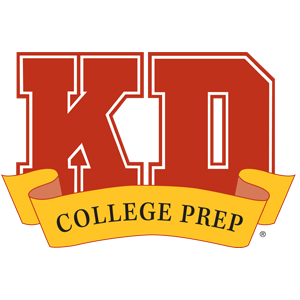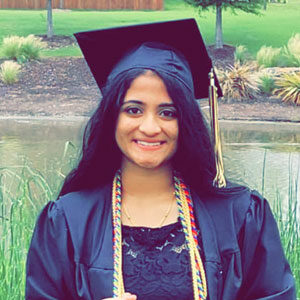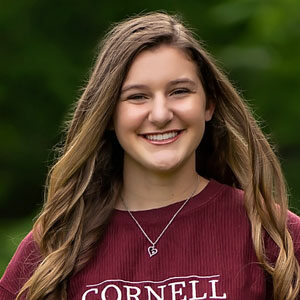It’s almost summer, and that means many rising high school seniors will shift their thoughts toward applying to college. But when is the best time to apply to college? And how long will it take?
We turned to our lead college counselor for advice on what to expect when applying to college this fall. Ashley McCarrick is the Chief of College Counseling Services at KD College Prep and the mastermind behind our APPLY NOW! Boot Camp. During these sessions, McCarrick and her team work directly with students to provide guidance and help them get a head start on the college application and essay writing process.
“Students consider the application to be a bunch of boxes that they need to check off or a resume that they need to have filled out. But if you’re approaching it from that perspective, then you’re missing that the application should be a reflection of your life and your interests rather than you working to fill out a piece of paper,” McCarrick says.
College applications are very time-consuming and confusing, and there’s a lot of misinformation out there. In this post, we’ll help demystify the process by answering a few key questions.
When Is the Best Time to Apply to College?
The short answer is it’s best for most students to start on the physical college application the summer before 12th grade. But when looking at the big picture, the process of applying to college actually starts as early as middle school when students start selecting high school courses or thinking about which extracurriculars to join.
“The college application process doesn’t start in 11th or 12th grade—it’s the development of you as a person that starts much earlier,” says McCarrick.
Keep in mind that the application process varies from student to student. For example, if you have early college decision deadlines, want to be a college athlete, or plan to apply to colleges that have fairly complicated applications (like multiple essay requirements), you may want to start sooner than that.
“It takes a lot longer than you think to apply to college, especially if you’re applying to more selective colleges where they might have four to eight extra essays. That adds up quickly,” McCarrick says.
Each year, Common App® opens in early August, and this typically signals the start of college application season. Common App essay prompts are usually available earlier on and often are quite similar from year to year.
How Long Do College Applications Take?
In general, students can expect to spend about 100 hours on college applications (if applying to 10 moderately selective schools). But the specific amount of time you spend applying to colleges as a whole depends on the number of schools to which you’re applying and the application requirements for each of those schools. The more selective a college is, the more intensive its process tends to be.
“If you’re applying to large public schools, the numbers are going to weigh in a little more and some of the subjective pieces are going to matter a little less, unless you are applying to competitive majors, honors programs, or specific scholarships. Less selective colleges may have fewer essays for you to write, so depending on your list, you may get away with spending less time than that,” McCarrick says.
Plan to spend some time proofreading and revising your essay before submitting your application. While you probably could fill out your entire application from start to finish and write a whole essay in a day, that rarely garners the best results. It’s better to complete aspects of the process in smaller pieces over the course of a few months rather than rush through the entire thing in one sitting.
“I could write an essay today for a deadline tonight. But if someone else reads it, would they agree that it’s a great essay? Probably not. It’s very likely that when you give yourself more time, it allows the brain to have the space to go back and revise pieces that maybe need to be updated. Can you rush it? Absolutely. Is it the best choice? No,” McCarrick says.
One mistake students often make is they don’t spend enough time researching colleges to narrow down their college list to a manageable 7-10 schools. Ideally, you should research schools in 10th and 11th grade. Plan to have your college list close to finalized by the end of junior year.
“I think the quality [of college applications] tends to decrease after about 10 schools. It’s hard to write great content for more than that number. But also, at a fundamental level, if you’re applying to 20 schools, you probably have not researched enough. There are differences in colleges. If you’re just picking the top 20 colleges in the nation—you haven’t really researched,” McCarrick says.
Read more about common college application mistakes.
What Is the Hardest Part of College Applications?
“There’s no question—it’s the essays,” McCarrick says.
It can be a challenge to squeeze who you are as a person into a short 400-600 words. Not to mention, creative writing doesn’t come naturally to every student, yet essays are often required regardless of whether you plan to study something STEM-related or in the liberal arts.
“Let’s face it. For some math or science-focused students, writing is not their strong suit. Then all of a sudden they have to write about their strengths and who they are. At Texas A&M, you not only have to write an engineering essay—if you want to be in engineering honors, there are extra essays that you’ll have to write. And that can be a surprise for a lot of students,” McCarrick says.
College application essays are different from the research papers students write in their English classes. Colleges expect students to share who they are on a personal level in these essays. That can be hard for many teenagers. Oftentimes, students feel lost in the process because they struggle to find a topic that really tells their story.
“I love seeing students find a story that they never knew they had in them. So many students will say, ‘There’s nothing unique about me. I’m just an average teenager.’ What they fail to realize is that they do have a unique story. And they just need help pulling that out and finding their voice to write about it,” McCarrick says.
Essays also tend to be one of the most time-consuming aspects of the process. It can take a student multiple drafts to develop a truly unique essay.
First, it’s best to map out how many essays you anticipate writing based on the requirements for each school on your list. The more essays you have, the more time you’ll need to spend on the process.
“I have a student who wrote 68 essays this year. That obviously is going to require more time and effort,” McCarrick says.
Should I Submit the Optional Essay?
Not every college application will require the essay. Some colleges require one in lieu of test scores (if you plan to apply test optional) or it may only be required if you’re applying to a competitive degree program. However, even if the essay is optional, you should consider writing one to add a personal element to your application.
“Colleges get your grades, GPA, test scores, and the classes you took. They get all of these factual items, but it doesn’t help you come alive as a person. Any opportunity where you can show them your interests and the type of person you are and what you can contribute to the campus is going to make your application stronger. Plus at the very basic level, it shows that you’re interested enough in that college to write an essay for them and to send it,” McCarrick says.
It’s best to check a school’s application requirements early on in your application season so you won’t be surprised by additional items too late in the process.
Have College Applications Become Harder Over the Years?
For parents, it’s easy to underestimate how the college application process has become more complicated over the years.
“With the advent of technology and its place in the application process, we have, in a lot of ways, added more complexity to the process,” McCarrick says.
Back when your parents were applying to college, everything was collected into a manilla envelope and mailed off to the college. Today, there are numerous online application tools and portals. Each college seems to accept its own combination of these, which can make things very confusing for families.
For example, one college may require students to fill out the college application via one online platform but then require recommendation letters to be submitted through an additional portal. Furthermore, some colleges will have additional portals for things like housing or financial aid.
In some ways, technology has simplified things. Tools like Common App have definitely streamlined the process of applying to more schools. But be aware that not every school accepts the Common App. Even if they do, you may be required to complete additional steps elsewhere.
Some colleges have started realizing that by removing or simplifying the application process, they can drastically increase their application numbers. We’ve seen them remove aspects of the application (like test scores or supplementals) to drive more applicants during the pandemic.
For example, Northeastern University decided to remove its supplemental essay requirement last year. Consequently, they saw an increase from 75,000 applications in 2021 to 91,000 applications in 2022. Many other colleges have made similar moves to increase the volume of applications during the pandemic.
The lack of consistency in requirements from college to college just reiterates the point we made earlier: it’s better to start early on your applications. You want to make sure you get every detail right. Once the application is sent and the deadline has passed, there’s not an easy way to go back and change your submission.
“I’ve seen kids put in the wrong birthday, or they just make silly mistakes because they don’t realize how that impacts the application process later on… You need to focus your attention on every aspect of the application process because if you don’t follow the guidelines or recommendations for one aspect of it, why would a college accept you?” McCarrick says.
Read more about how applying to college has changed over the last 25 years.
How Can I Get Help with My College Applications?
KD College Prep offers numerous resources to help students complete their college applications. Our APPLY NOW! Boot Camp was designed specifically to help students get a head start on college applications and essays. This includes providing specific guidance on how to master the process, how to write the admissions essay, and one-on-one time with a college counselor to go over his/her revisions and suggestions for your essay.
“If you have someone reviewing and looking at things, they can let you know if something you’re saying is coming across in the wrong way. I’ve read essays that were written to be funny, but when a stranger reads it, it’s not going to come off as funny. Instead, it comes across as condescending, sarcastic, or uninformed,” McCarrick says.
It helps to have someone outside your inner circle who can look over your work. Your parents and friends know you on a personal level, so they won’t read your application in the same way a college admissions officer would.
One mistake students sometimes make is they rely too much on their parents for help. And while this may seem obvious, it’s so important to not let your parents write your essays for you. Parents should be there to support the student throughout the process and help hold them accountable, but the student needs to be the one doing the work.
A college counselor can provide an objective perspective on your essays and give you specific advice on how best to approach the various aspects of the process. Plus, it’s nice to have someone to go to when you have questions.
“The student still has to be in charge of the process, but you almost have a sounding board… It helps a family stay sane and happy with one another,” McCarrick says.
4 Benefits of Attending the APPLY NOW! Boot Camp
1. Get a Head Start
If you struggle with getting started on college applications, the boot camp can help you find the motivation.
Each year, KD College Prep hosts in-person and online boot camp sessions during the summer and early fall. Each small group session consists of four meeting times, each about 2.5 hours long. Attendees spend about 10 hours learning about the application process. The majority of this time is dedicated to writing and refining the general admissions essay (as well as supplementals).
The boot camp adds structure to the college application process with its set meeting times and robust curriculum. KD also provides planning materials that help keep students organized.
2. Learn the Basics
These guided sessions help students go over the application itself, the various requirements, and what to expect in the process.
Tate D. is a former Boot Camp student who will attend Pepperdine University next year. She benefited from learning about the process, finding answers, and having someone to keep her accountable.
“On the first day of the Boot Camp, a lot of my stereotypes that I had in my head about essays or how my application should look were completely shattered… It was so helpful. I don’t know how I could have done it otherwise,” Tate says.
3. Find Your Voice
Perhaps one of the most unique aspects of the boot camp is the one-on-one guidance students receive on their essays. College counselors work with students to brainstorm topics and provide honest feedback on the quality of their essays.
“I ended up writing an essay that I absolutely loved, and it was something that was really unexpected for me to write about… I’ve always been someone who loves writing. English has always been my best subject. But the admissions essay is completely different from anything I’ve ever written… It can be really intimidating. The Boot Camp helped me have a different perspective on that,” Tate says.
4. Apply What You Learned
Once students have a foundational idea of what to expect and have workshopped their resume and first essay, they can start to build out a plan for completing their applications. Usually, that means breaking the process down into smaller tasks that are easier to manage.
“If you break it into small chunks by putting your phone away and setting a timer, you finish faster. You feel like you accomplished something. And that’s really the best way to approach the whole process,” McCarrick says.
Katherine J. is a former boot camp student who now attends Rice University. She liked how the boot camp felt tailored to each person, and she found it easy to transfer the content she had worked on in the boot camp to her physical applications.
“Building my resume with the boot camp was so efficient and helpful. They gave me a specific structure that I filled out and helped me write the specific wording that was best for each activity that I was involved in. And it helped me in every application that I used because I could transfer what I wrote on the resume to the application,” Katherine says.
Need Help Applying to College?
KD College Prep offers college counseling programs to help students maximize their chances of acceptance. If you want to learn more, schedule a free consultation with a member of our team.














































